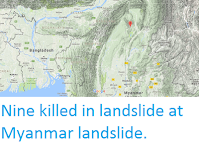Five people, described as all being members of the same family, have died in a landslide in the city of Mogok in the Mandalay Region of Myanmar. The incident happened at about 4.00 am local time on Thursday 14 June 2018, when the landslide hit a house in which the family were sleeping. The incident happened following several days of heavy rain in the area, associated with the southwest monsoon, which brings heavy rains to Myanmar between May and October. Landslides are a common problem after severe weather events, as excess
pore water pressure can overcome cohesion in soil and sediments,
allowing them to flow like liquids. Approximately 90% of all landslides
are caused by heavy rainfall.This year's monsoon has been particularly severe, with floods and landslips occurring across the country, though so far these are the only reported fatalities.
The scene of the 14 June 2018 Mogok landslide. Hein Zaw Thu/Facebook/Radio Free Asia.
Monsoons are tropical sea breezes triggered by heating of the land during the warmer part of the year (summer). Both the land and sea are warmed by the Sun, but the land has a lower ability to absorb heat, radiating it back so that the air above landmasses becomes significantly warmer than that over the sea, causing the air above the land to rise and drawing in water from over the sea; since this has also been warmed it carries a high evaporated water content, and brings with it heavy rainfall. In the tropical dry season the situation is reversed, as the air over the land cools more rapidly with the seasons, leading to warmer air over the sea, and thus breezes moving from the shore to the sea (where air is rising more rapidly) and a drying of the climate.
Diagrammatic representation of wind and rainfall patterns in a tropical monsoon climate. Geosciences/University of Arizona.
Much of Southeast Asia has two distinct Monsoon Seasons, with a Northeast Monsoon driven
by winds from the South China Sea that lasts from November to February
and a Southwest Monsoon driven by winds from the southern Indian Ocean from March to October. Such a double Monsoon Season is common
close
to the equator, where the Sun is highest overhead around the equinoxes
and lowest on the horizons around the solstices, making the solstices
the coolest part of the year and the equinoxes the hottest. However Myanmar is largely protected from the Northeast Monsoon by the mountains separating the country from Yunnan Province in China.
The winds that drive the Northeast and Southwest Monsoons in Southeast Asia. Mynewshub.
See also...
Follow Sciency Thoughts on Facebook.









